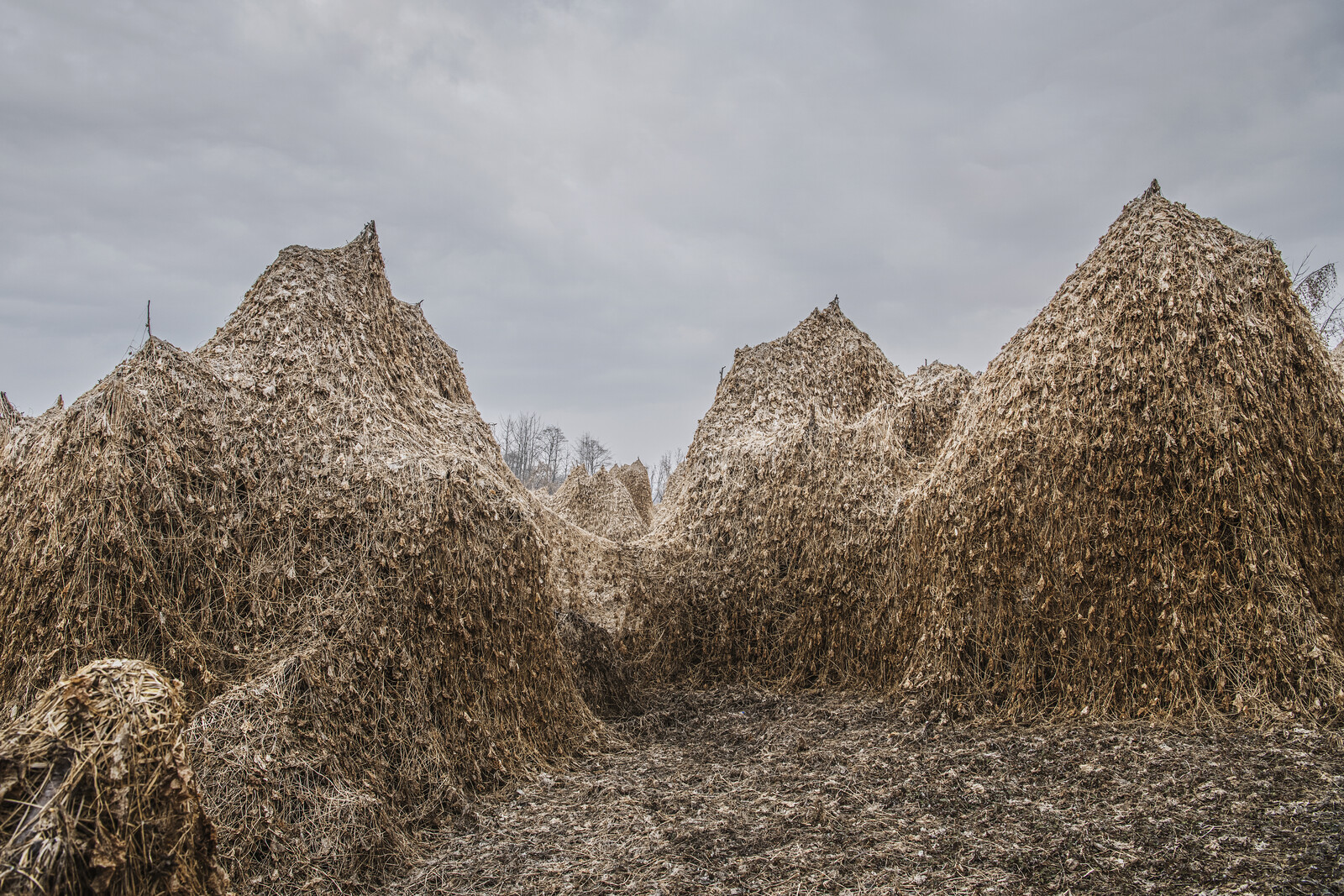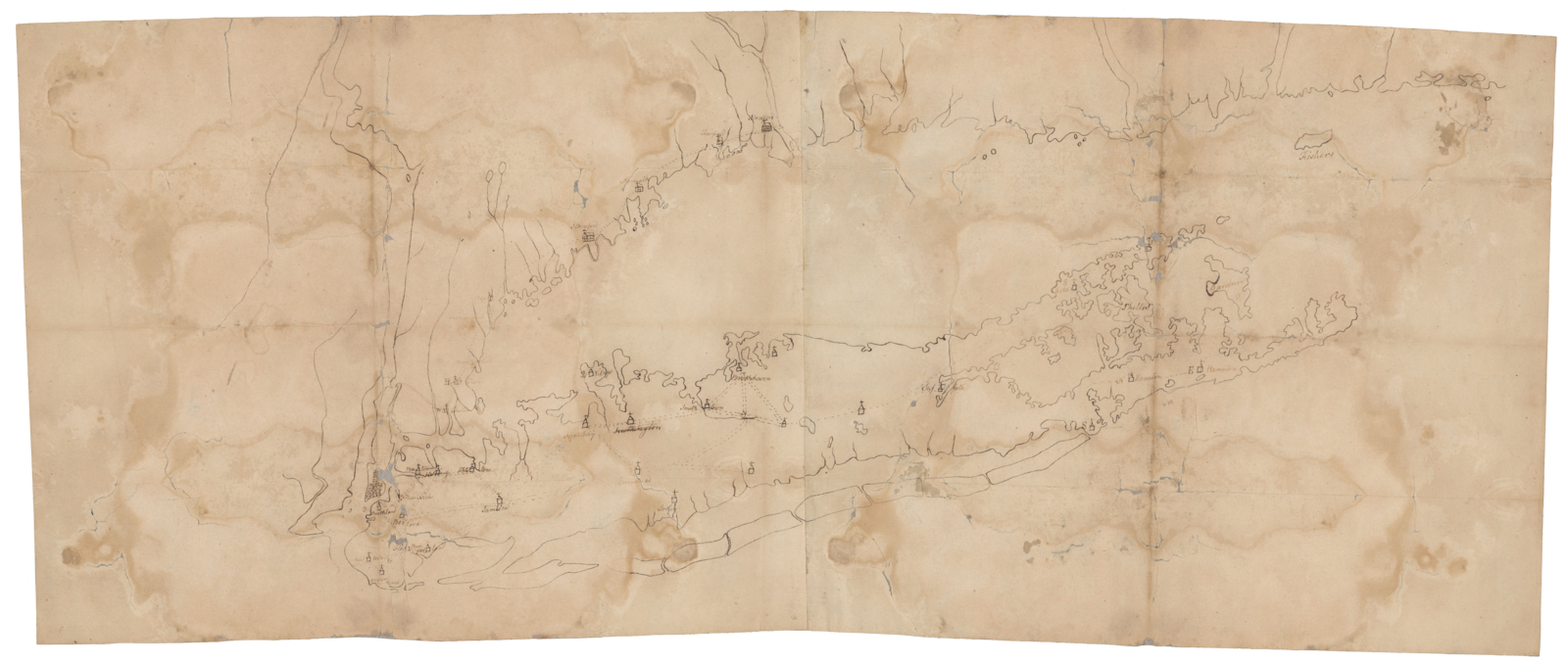There is an abundance of data, predictions, and signs that the climate crisis is on the verge of catastrophe. However, I do not want to imagine a future without humans. Even in the very worst case, I don’t want to give up hope that a small number of people, living close to the land in a small corner of the earth, will survive. The script for a play below, The Declaration of Innocence, is the product of this frail hope. It borrows the form of Greek tragedy and summons dogs, pigs, and people who would have lived on a small island of the Solomon Islands in the South Pacific hundreds of years ago. Although the characters and animals appearing in the play are fictional, the story is based on archeological research on the extreme population control measures that the inhabitants of Tikopia chose for their common survival, and on news reports about how the islanders were able to survive without losing a single life when the entire island was devastated by a powerful cyclone at the turn of the twenty-first century.
After people settled in Tikopia, which has a landmass of only 4.6 square kilometers, the population increased with the development of agriculture and livestock farming. This eventually led to the island becoming uninhabitable. But rather than abandoning the island, the people changed their farming methods to revive the natural environment. At the same time, in order to keep the population size down to a level that the island’s ecosystem could support, parts of the population were forced to remain single, abortion was encouraged, and even newborn infants were killed. Or, in order to save the infant’s life, one of the family members could choose to die, or be banished to the sea in a makeshift canoe loaded with some food. On top of this, around the year 1600, all the pigs on the island were slaughtered, and the islanders returned to a plant- and fish-based diet. This was not a temporary crisis-response, but a practice that has been ongoing for hundreds of years, continuing into the 1920s, when the New Zealand anthropologist Raymond Firth visited Tikopia.
Although the island’s population control measures have changed over time, Tikopia still maintains a population size of about 1,200, as in the past. The islanders’ extraordinary disaster response ability was once again brought to international attention in late 2002, shortly after the record-breaking Typhoon Joe hit Tikopia. According to news reports at the time, they evacuated the children and elderly to the only small cave on the island, while the remaining residents, reading the direction in which the cyclone was moving, ran in the opposite direction for several days and nights. All the islanders survived.
Scene: Much of the earth has been swept away by the devastation caused by the climate crisis, with only a small patch of nature and a small native village remaining. Just before dawn, in front of a low hut into which adults and even children must crawl, an old man is shrouding the corpse of a young man, laid out on a stretcher, with large leaves.
ELDERLY UNDERTAKER
Oh, indifferent gods and heartless humans!1
Why trim a hardy green leaf without pruning back old withered leaves?
CHORUS OF ELDERLY BACHELORS (LEFT)
Tut-tut! This old man has lost his mind.
CHORUS OF ELDERLY BACHELORS (RIGHT)
Humans accept the gust of fate when reduced to hunger.
CHORUS OF ELDERLY BACHELORS (LEFT)
A long long time ago, when I was a child,
a great big calamity was visited upon on this earth.
CHORUS OF ELDERLY BACHELORS (RIGHT)
It was all because the mind had gone blind.
CHORUS OF ELDERLY BACHELORS (LEFT)
The heaven and ocean formed a union,
and ravaged everything on earth.
CHORUS OF ELDERLY BACHELORS (RIGHT)
I cannot tell about its devastation,
for I hid in a dark cave and did not see.
CHORUS OF ELDERLY BACHELORS (LEFT)
When the sun again shone,
everything on earth floated like a buoy.
CHORUS OF ELDERLY BACHELORS (RIGHT)
Even the dead were too afraid to rise up again.
CHORUS OF ELDERLY BACHELORS (LEFT)
Someone, a god stole us away,
helping us escape the destruction.
ELDERLY UNDERTAKER
What then was the intention if not to annihilate?
The screams of murdered infants echoed throughout the village.
CHORUS OF ELDERLY BACHELORS (RIGHT)
You dastardly old man,
you dare say a father who dies in place of his child is not noble?
CHORUS OF ELDERLY BACHELORS (LEFT)
You dare say a mother who does not give birth to a life to be killed is not virtuous?
ELDERLY UNDERTAKER
Do you not hear the cry of screaming souls?
The soul of the young man, slipping out of the corpse, begins to look around.
MAN
Oh, nobly born child, where are you? Where are you?
Oh, my grieving family, where is my child?
Oh, my slumbering neighbors, have you not seen my child?
Soon after, the souls of the man’s dog and pig approach him.
PIG
Oh, dear master, I am not a foul pig.
I have not woken the infant.
I have not snatched away the infant’s milk.
DOG
Oh, dear master, I am not a wicked dog.
I have not bitten the infant.
I have not snatched away the infant’s food.
The man wandering through the wet fog at dawn does not hear the appeals of the dog and the pig.
MAN
Oh, nobly born child, where are you? Where are you?
Oh, my grieving family, where is my child?
Oh, my slumbering neighbors, have you not seen my child?
The dog and the pig follow the man, continuing their pleas. Just as Ani of Thebes at the court of the gods refuted one by one the forty-two sins the ancient Egyptians considered taboo, they proclaim their innocence.2
DOG
Oh, master, who swam with me the clear stream waters,
I have never fouled the water.
I have not obstructed the flow of water.
I have never taken water from the thirsty.
PIG
Oh, master, who made a bed for me to lie on with grass from golden fields,
I have never polluted the land.
I have not stolen the land.
I have never taken the bread of the poor.
DOG
Oh, master, who would lie with me on green fields listening to birdsongs,
I did not make the birds go silent.
I did not cut down the trees where the birds nested.
I did not deprive the birds of their food.
PIG
Oh, master, who always gave me hearty meals,
I have never envied the baby.
I have not envied the fat pigs.
I have never despised anyone.
DOG
Oh, master, who was tormented night after night by my sacrifice,
I have never wished for your suffering.
I have not terrorized you.
I have never despised you.
DOG AND PIG
Oh, master, who could not look me in the eyes,
I did not wish for your suffering.
I did not terrorize you.
I did not despise you.
Gradually as dawn begins to break, people gather one by one in front of the hut and begin to sing.
VILLAGERS
If~you~leave~now~when~will~you~return~If~you~leave~now~when~will~you~return~
Tell~us~the~day~you~will~return~Tell~us~the~day~you~will~return~
How~to~depart~how~to~depart~leaving~behind~your~precious~family~
A~wealth~of~devoted~villagers~but~who~will~leave~in~your~place~
Lifelong~friends~are~many~but~who~will~go~with~you~to~that~place~
The man finds the sleeping infant in the arms of a young woman and approaches them. Caressing the infant’s face in his palms he kisses it. The woman does not feel the man’s presence.
MAN
Oh, child born of virtue, my precious child,
asleep in the arms of our friend without a care in the world.
You cannot see me but I am watching you.
Oh, child born without blame, my precious child,
the gift you gave me was your life.
The gift I gave you was my life.
A group of bachelors and spinsters appears amongst the crowd. Eight spinsters slowly lift the stretcher on which the corpse lay with matching footsteps, while four bachelors begin to wail.3
WAILING BACHELORS
A-i-go~~A-i-go~~A-i-go~~A-i-go~~4
When the spinster holding the handbell leads with a slow tune, the spinsters carrying the funeral bier sing along, taking one step forward and one step back, repeatedly.
HANDBELL-RINGING SPINSTER
Leav~ing~home~Leav~ing~home~~~Our~friend~is~leav~ing~home~
PALLBEARING SPINSTERS
Leav~ing~home~Leav~ing~home~~~Our~neigh~bor~is~leav~ing~home~
Leav~ing~home~Leav~ing~home~~~Our~friend~is~leav~ing~home~
Leav~ing~home~Leav~ing~home~~~Our~neigh~bor~is~leav~ing~home~
WAILING BACHELORS
A-i-go~~A-i-go~~A-i-go~~A-i-go~~
The man follows the procession and approaches a crying woman.
MAN
Oh, woman, who must live without guilt, do not weep.
Our child is sleeping. In our friend’s arms, our child sleeps.
Oh, woman, with whom I can no longer share a life, dry your tears.
Hold our child in your arms. When the child awakes and cries for its mother, hold our child in your arms.
WAILING BACHELORS
A-i-go~~A-i-go~~A-i-go~~A-i-go~~
The funeral procession begins to slowly circle the village, singing of memories of the deceased. Intermittently, an indecipherable refrain repeats.
HANDBELL-RINGING SPINSTER
De~part~ing~~De~part~ing~~Our~friend~is~de~part~ing~
PALLBEARING SPINSTERS
De~part~ing~~De~part~ing~~Our~friend~is~de~part~ing~
Lo~lo-lo~lo-o-o-o~e-hwa-neom-cha~lo-o-hwa~5
Lo~lo-lo~lo-o-o-o~e-hwa-neom-cha~lo-o-hwa~
HANDBELL-RINGING SPINSTER
De~part~ing~~De~part~ing~~Our~friend~is~de~part~ing~
PALLBEARING SPINSTERS
De~part~ing~~De~part~ing~~Our~friend~is~de~part~ing~
Lo~lo-lo~lo-o-o-o~e-hwa-neom-cha~lo-o-hwa~
Lo~lo-lo~lo-o-o-o~e-hwa-neom-cha~lo-o-hwa~
HANDBELL-RINGING SPINSTER
Our friend with whom we hid in a cramped cave and with whom we cried together
PALLBEARING SPINSTERS
Our neighbor with whom we ran together on that day of the savage winds
Lo~lo-lo~lo-o-o-o~e-hwa-neom-cha~lo-o-hwa~
Lo~lo-lo~lo-o-o-o~e-hwa-neom-cha~lo-o-hwa~
HANDBELL-RINGING SPINSTER
Three nights and four days without repose
PALLBEARING SPINSTERS
We ran and ran
Lo~lo-lo~lo-o-o-o~e-hwa-neom-cha~lo-o-hwa~
Lo~lo-lo~lo-o-o-o~e-hwa-neom-cha~lo-o-hwa~
HANDBELL-RINGING SPINSTER
The whims of harsh winds
PALLBEARING SPINSTERS
Running hither and thither
Lo~lo-lo~lo-o-o-o~e-hwa-neom-cha~lo-o-hwa~
Lo~lo-lo~lo-o-o-o~e-hwa-neom-cha~lo-o-hwa~
HANDBELL-RINGING SPINSTER
Running hither and thither
PALLBEARING SPINSTERS
Running hither and thither
Lo~lo-lo~lo-o-o-o~e-hwa-neom-cha~lo-o-hwa~
Lo~lo-lo~lo-o-o-o~e-hwa-neom-cha~lo-o-hwa~
WAILING BACHELORS
A-i-go~~A-i-go~~A-i-go~~A-i-go~~
The crying woman sings behind the pallbearers.
WOMAN
A-i-go~~A-i-go~~ heartbreaking and lamentable
When spring comes next year will my husband return
How far is the road to heaven why is he leaving home
PALLBEARING SPINSTERS
Lo~lo-lo~lo-o-o-o~e-hwa-neom-cha~lo-o-hwa~
Lo~lo-lo~lo-o-o-o~e-hwa-neom-cha~lo-o-hwa~
WAILING BACHELORS
A-i-go~~A-i-go~~A-i-go~~A-i-go~~
The man approaches the woman and lovingly strokes her back.
MAN
Oh, woman, who is to me like air to the birds, dry your tears.
There is not a single tree in this world that is unshaken by the wind.
Even if you live for a hundred years, if you take away all your worries, if you take away the days of sickness and slumber, you live no longer than forty years.
Whether too soon or too late, the time has come for me to go.
WAILING BACHELORS
A-i-go~~A-i-go~~A-i-go~~A-i-go~~
The man’s song bleeds into the song of the pallbearers.
HANDBELL-RINGING SPINSTER
Even with devoted villagers, who will leave in his place
PALLBEARING SPINSTERS
Even with devoted friends, who will leave in his place
Lo~lo-lo~lo-o-o-o~e-hwa-neom-cha~lo-o-hwa
Lo~lo-lo~lo-o-o-o~e-hwa-neom-cha~lo-o-hwa
HANDBELL-RINGING SPINSTER
The road from which you cannot return, how is it you must travel it alone
PALLBEARING SPINSTERS
Are you not afraid of the mountain, are you not afraid of the ocean
Lo~lo-lo~lo-o-o-o~e-hwa-neom-cha~lo-o-hwa
Lo~lo-lo~lo-o-o-o~e-hwa-neom-cha~lo-o-hwa
WAILING BACHELORS
A-i-go~~A-i-go~~A-i-go~~A-i-go~~
As the pallbearers begin to ascend the steep hill, the handbell-ringing spinster raises her voice and sings in a fast-paced tune, boosting the pallbearers’ strength. The shortened refrains are repeated in rapid succession.
HANDBELL-RINGING SPINSTER
My life without love my fate without children
PALLBEARING SPINSTERS
E-hwa-neom-cha~lo-o-hwa~lo-o-hwa~~E-hwa-neom-cha~lo-o-hwa~lo-o-hwa~~
HANDBELL-RINGING SPINSTER
I will hold your child in my arms and pat your love on the back
PALLBEARING SPINSTERS
E-hwa-neom-cha~lo-o-hwa~lo-o-hwa~~E-hwa-neom-cha~lo-o-hwa~lo-o-hwa~~
HANDBELL-RINGING SPINSTER
Do not worry about the savage winds I will hide your child in a cave
PALLBEARING SPINSTERS
E-hwa-neom-cha~lo-o-hwa~lo-o-hwa~~E-hwa-neom-cha~lo-o-hwa~lo-o-hwa~~
HANDBELL-RINGING SPINSTER
Do not worry about your wife who no longer eats I will nourish and soothe her
PALLBEARING SPINSTERS
E-hwa-neom-cha~lo-o-hwa~lo-o-hwa~~E-hwa-neom-cha~lo-o-hwa~lo-o-hwa~~
WAILING BACHELORS
A-i-go~~A-i-go~~A-i-go~~A-i-go~~
The man sings to the procession.
MAN
Oh my love who is like water to the fish rise up
Before the lake dries up again
Oh my friends who ran with me into the cave rise up
Before the savage winds strike again
My villagers with many words and many woes shake it off and rise up
Before the birds fall silent again
The dog and the pig sing as they approach the funeral procession.
DOG AND PIG
Going going I am going to the place I used to live
Dear master dear villagers worry about me no more
In the beginning I came from the forest in the beginning I came from the mountain
Here and there I will be happy this and that I will eat
Even as chubby as I am I am still good at running
Your teeny tiny house not so comfortable it was
Yet you fed me and housed me so what else was I to do
Listen bad master of all the hardships I suffered I have forgotten
Listen good master a good lifetime I have lived
Worry about me no more and have a good life
Without disaster without misfortune have a good life
Going going I am going to the place I used to live
After returning from the water burial, the man’s family, friends, and neighbors adorn themselves with flowers and leaves and gather in front of the hut. The dog and the pig, wearing garlands, also join the crowd. They all begin to sing and dance together.
ALL TOGETHER IN UNISON
Nice day pleasant day the day is so delightful
Kwae-ji-na~ching-ching-na-ne~~Kwae-ji-na~ching-ching-na-ne~~
Going going out to play I am going to the grassy fields I go to play
Kwae-ji-na~ching-ching-na-ne~~Kwae-ji-na~ching-ching-na-ne~~
Green grass clothes you are making and pretty birds befriending
Kwae-ji-na~ching-ching-na-ne~~Kwae-ji-na~ching-ching-na-ne~~
Going going across I am going across the stream I am crossing
Kwae-ji-na~ching-ching-na-ne~~Kwae-ji-na~ching-ching-na-ne~~
With clear stream water you are cooking and little fishes befriending
Kwae-ji-na~ching-ching-na-ne~~Kwae-ji-na~ching-ching-na-ne~~
Villagers old and young just let it go let it go let it all go
Kwae-ji-na~ching-ching-na-ne~~Kwae-ji-na~ching-ching-na-ne~~
Once you leave you cannot return so let it all go and do not squabble
Kwae-ji-na~ching-ching-na-ne~~Kwae-ji-na~ching-ching-na-ne~~
While everyone is dancing and singing together, the man’s soul reaches the entrance of the underworld.
MAN
Oh, gods who I am meeting for the first time,
Why do you block the path of my soul, inquiring after my sins?
Is it a sin to toil in the fields dripping in sweat to feed your family?
Is it a sin to heat the house of elderly parents to keep them from the cold?
Is it a sin to feed the dog that trails my every step?
Thou shalt not commit adultery, so I have loved only one woman.
Wander alone like a rhinoceros, so I have traveled to the far distant road of the netherworld without a companion.
Oh, forgive me gods for not remembering each of your names.
Ask no more about the sins I have not committed, and release my soul.
Where to send it is your decision, so what dare I say on the matter.
Yet if you want to send me back to the world from which I came, let me return as a tree.
Flower or grass, bird or worm, dog or pig, what choice do I have in the matter.
They say that you have created human beings in the finest of molds.
Yet I dare say that you have made trees far superior to humans.
Some part of the dialogue between the Elderly Undertaker and the Chorus of Elderly Bachelors was adapted from the lines of the chorus and characters that appear in the Greek tragedy Agamemnon by Aeschylus.
The song of the dog and the pig, in which it is repeatedly declared that they did not harm the land, water, or other living beings, is inspired by “The Declaration of Innocence” from The Egyptian Book of the Dead. That is, it is a declaration made by souls of the dead as they face the gods at the entrance of the underworld, enumerating the deeds that human beings should not commit while inhabiting the living world.
The funeral procession in the play is modeled after that of Yeondo, a small island on the southern tip of the Korean peninsula, where only women carry the funeral bier. For the way the speakers address others to alleviate the fear of leaving this world, I referenced the Korean translation of Bardo Thodol, a Tibetan scripture read by monks or acquaintances to the dead or dying. And for the lyrics of the songs sung by the characters in the play, I have appropriated phrases from the Bible, the Koran, the Sutta Nipāta, and the Bhagavad Gita, with particular focus on various Korean funerary songs, which I have modified to fit the context and flow of the play.
Translator’s note: Aigo is a Korean expression that can be used similarly to the interjections “oh my!” “oh dear!” “dear me!” “good heavens!” as well as “ouch!” in English. It is a common yet versatile expression that is often used to express shock or surprise, but is also typically uttered by grieving family members, customarily women, at funerals and wakes.
Translator’s note: This refrain is a Korean chorus-like refrain that typically accompanies folk dancing and music used to express joy and pleasure in various farming-village community celebrations.
Tomorrow’s Myths is a collaboration between e-flux Architecture and “2086: Together How?,” the Korean Pavilion at the 18th International Architecture Exhibition, La Biennale di Venezia curated by Soik Jung and Kyong Park.
Subject
Translated from Korean by Alice S. Kim.










